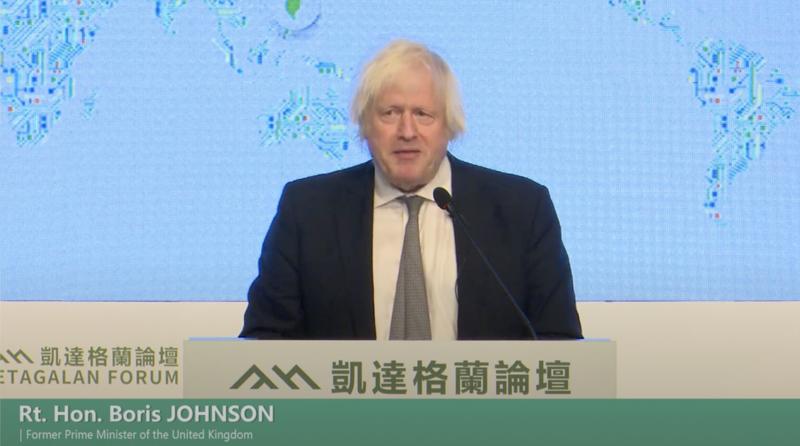Taiwan’s freedom is key to the technological advancement of the 21st century, and the world should protect that freedom from Chinese aggression, former British prime minister Boris Johnson said today in Taipei.
Johnson was addressing the opening of this year’s Ketagalan Forum hosted by the Ministry of Foreign Affairs on his first visit to Taiwan.
Johnson began his speech by talking about artificial intelligence (AI), which he said is the key technology of the 21st century, calling himself “a total believer in AI and addict of ChatGPT.”

Photo: Screenshot from the Ketagalan Forum livestream
He said he looks forward to AI being utilized to its full potential throughout professions, adding that “great technological change always ends up creating more well-paid jobs than it destroys.”
“All of it is made possible by Taiwan,” as about 95 percent of the microprocessors necessary for AI are made here, Johnson said.
The chief reason for Taiwan’s success in the field is because “this is a free country where everyone has the equal protection of the law,” which gives people the courage to innovate, he said.
“It is vital for the whole world that we protect that freedom,” Johnson said.
He said he supports peaceful dialogue across the Taiwan Strait and spoke out against China’s unilateral attempts to change the “status quo” through intimidation.
He denounced how China is trying to bully Taiwan into submission by sending boats into Taiwan’s waters and planes into its airspace, saying that “it is a huge mistake to use intimidating and aggressive measures against Taiwan.”
The UK should deepen its economic partnership with Taiwan in the face of Chinese aggression, Johnson said.
“We stand with you ... we share your values ... because we both understand that freedom is a wonderful thing,” he said.

Taiwan has received more than US$70 million in royalties as of the end of last year from developing the F-16V jet as countries worldwide purchase or upgrade to this popular model, government and military officials said on Saturday. Taiwan funded the development of the F-16V jet and ended up the sole investor as other countries withdrew from the program. Now the F-16V is increasingly popular and countries must pay Taiwan a percentage in royalties when they purchase new F-16V aircraft or upgrade older F-16 models. The next five years are expected to be the peak for these royalties, with Taiwan potentially earning

STAY IN YOUR LANE: As the US and Israel attack Iran, the ministry has warned China not to overstep by including Taiwanese citizens in its evacuation orders The Ministry of Foreign Affairs (MOFA) yesterday rebuked a statement by China’s embassy in Israel that it would evacuate Taiwanese holders of Chinese travel documents from Israel amid the latter’s escalating conflict with Iran. Tensions have risen across the Middle East in the wake of US and Israeli airstrikes on Iran beginning Saturday. China subsequently issued an evacuation notice for its citizens. In a news release, the Chinese embassy in Israel said holders of “Taiwan compatriot permits (台胞證)” issued to Taiwanese nationals by Chinese authorities for travel to China — could register for evacuation to Egypt. In Taipei, the ministry yesterday said Taiwan

Taiwan is awaiting official notification from the US regarding the status of the Agreement on Reciprocal Trade (ART) after the US Supreme Court ruled US President Donald Trump's global tariffs unconstitutional. Speaking to reporters before a legislative hearing today, Premier Cho Jung-tai (卓榮泰) said that Taiwan's negotiation team remains focused on ensuring that the bilateral trade deal remains intact despite the legal challenge to Trump's tariff policy. "The US has pledged to notify its trade partners once the subsequent administrative and legal processes are finalized, and that certainly includes Taiwan," Cho said when asked about opposition parties’ doubts that the ART was

If China chose to invade Taiwan tomorrow, it would only have to sever three undersea fiber-optic cable clusters to cause a data blackout, Jason Hsu (許毓仁), a senior fellow at the Hudson Institute and former Chinese Nationalist Party (KMT) legislator, told a US security panel yesterday. In a Taiwan contingency, cable disruption would be one of the earliest preinvasion actions and the signal that escalation had begun, he said, adding that Taiwan’s current cable repair capabilities are insufficient. The US-China Economic and Security Review Commission (USCC) yesterday held a hearing on US-China Competition Under the Sea, with Hsu speaking on